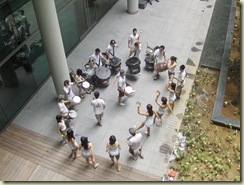 Today I was talking with one of my colleagues who did just hang up from a call with his boss. Wouldn't it be so much easier to see his face on my screen when I talk to hem, he pointed out to me. And indeed, he is probably right.
Today I was talking with one of my colleagues who did just hang up from a call with his boss. Wouldn't it be so much easier to see his face on my screen when I talk to hem, he pointed out to me. And indeed, he is probably right.
Including video in communications is something that is done daily today. Friends, who's son is currently living in Cairo with a small child, are seeing their grand daughter growing day after day through Skype. They love it as it really establishes a relationship between them. Why is that not used in the corporate world? It's actually a good question.
In our company, the video portion of NetMeeting is disabled to ensure we cannot use it. When asking around, two key arguments come up. The first is, not surprisingly, cost reduction. It seems such video feeds take quite some bandwidth and would clog the corporate network. The Internet isn't, so why would the corporate network be? And with all the fiber in the ground, capacity is cheaply available if required. The second argument is security. And here too, I have my question marks. Knowing that our phones are tapped, our SMS's followed etc. what is the security issue here? Is it really such an issue if somebody sees my face? Or is it the IT department that is not eager to have things done outside their control?
The fundamental question is really how much we could improve productivity through the use of more multi-media collaboration techniques? I would like to argue that the potential additional cost and risk of using such tools is easily offset by the benefits gained from higher productivity and improved communication.



 Today, I do a first, at least for me. And this consists in presenting at a conference in Las Vegas from the comfort of my home office. I am a little afraid as I have no idea who is at the other end of the line and whether they can hear me well. I did send them my presentation ahead of time, so they will be able to follow and get plenty of animation to ensure they don't fall asleep. But I have no idea what it will be for them, not having the speaker standing in front of them and looking at them in the eyes. The advantage for me is that I don't need to dress up. They will not realize I don't wear a tie.
Today, I do a first, at least for me. And this consists in presenting at a conference in Las Vegas from the comfort of my home office. I am a little afraid as I have no idea who is at the other end of the line and whether they can hear me well. I did send them my presentation ahead of time, so they will be able to follow and get plenty of animation to ensure they don't fall asleep. But I have no idea what it will be for them, not having the speaker standing in front of them and looking at them in the eyes. The advantage for me is that I don't need to dress up. They will not realize I don't wear a tie. 